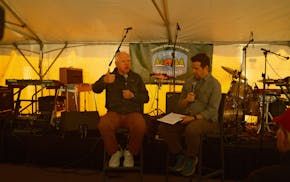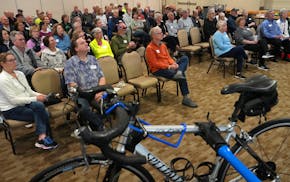Gov. Tim Walz said Saturday that there should be a higher bar for approving copper-nickel mines near the Boundary Waters Canoe Area Wilderness compared with other areas and cast doubt on whether technology is advanced enough to produce the metals without polluting water.
"I just think you have to take it into the context of how special the place is," Walz said. "Is the technology able to do it? I don't think it is at this point in time."
Only one project has been proposed in the Rainy River watershed, which flows into the BWCA. Twin Metals Minnesota hopes to mine for copper, nickel, cobalt and other metals near Ely and Babbitt. The company, a subsidiary of Chilean mining giant Antofagasta, has not yet submitted a mine plan for state regulators to scrutinize.
But Twin Metals' prospects have changed several times based on who lives in the White House. Presidents Barack Obama and Joe Biden took steps to stop Twin Metals and copper-nickel mining in the Rainy River watershed, while Donald Trump has supported actions to advance the Twin Metals project and promised to reverse a federal ban on mining in a 225,000-acre section of Superior National Forest.
"The regulatory process for Twin Metals Minnesota has been paused for several years, and the Twin Metals project is not currently under review," Twin Metals spokeswoman Kathy Graul said in a written statement.
"All proposed mining projects must go through an extensive environmental review process at both the state and federal level before permits can be issued. Mining companies must prove they can meet all environmental standards in place before moving forward with building a mine."
Walz on Saturday lamented how mining has become a political issue. He made his comments at the Minnesota Star Tribune's Strib Unbound event in Minneapolis promoting outdoor adventures.
"Now it's like wearing your team on this," Walz said. "If you're a certain political ideology, you're for mining no matter what it says. If you're on the other side, you're against mining."
The governor said he believes in producing metals domestically, as China has curbed access to rare earth metals that are critical to most modern technology. He added that metals like copper come from the Democratic Republic of Congo, "where children are mining them."
Walz said he understands critics of mining in northeast Minnesota who fear it will pollute lakes and rivers. The state, he said, has to follow science, regulatory processes and the law when considering projects like Twin Metals.
There are two other potential copper-nickel mines in Minnesota, one proposed by NewRange Copper Nickel near Hoyt Lakes and another by Talon Metals near Tamarack.
The state Department of Natural Resources in 2023 did not side with environmental groups that wanted to ban copper-nickel mining in the Rainy River watershed, and upheld its own state regulations. Those groups are suing over the regulations.
Still, Walz said, "This particular area and this particular plan ... has not been fleshed out at this point."
"The place holds for Minnesotans, and I would think for a lot of Americans, holds a uniquely special place," the governor said. "And outdoor spaces that hold that, I think the bar is much higher. ... At this point in time, I don't think they're ready to do this."
Protesters chant after arrest of judge accused of helping man evade immigration authorities
Brooks: Young Minnesotans, register to vote like your future depends on it

Walz casts doubt on environmental safety of mining near Boundary Waters

Minnesota Senate passes bill granting benefits to Hmong and Lao veterans

